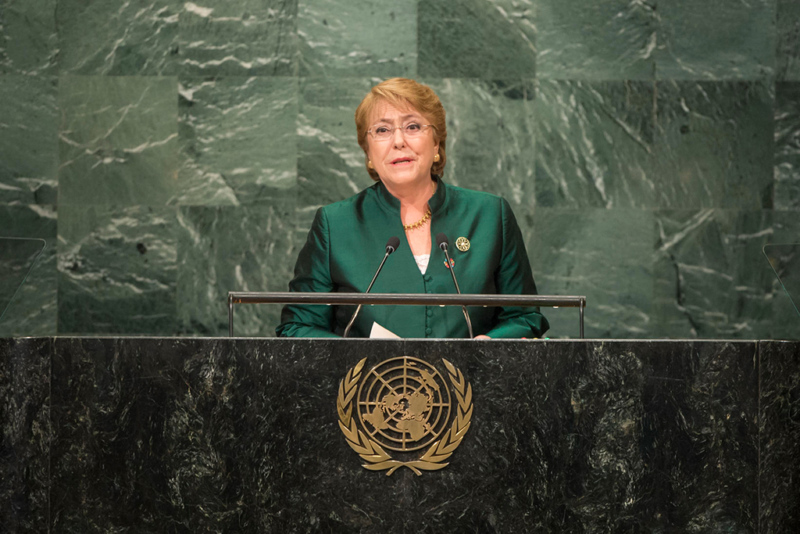Latin America Advisor
A Daily Publication of The Dialogue
Are Latin America’s Leaders Turning Away From the U.S.?
 Inter-American Dialogue
Inter-American Dialogue
World leaders traveled to the United Nations for its General Assembly in mid-September, with speeches including ones from Brazilian President Michel Temer decrying protectionism, Colombian President Juan Manuel Santos backing peace processes, Chilean President Michelle Bachelet stressing the need to fight climate change and U.S. President Donald Trump articulating his “America First” vision to a global audience. What were the biggest takeaways for the Western Hemisphere following the assembly? As many Latin American presidents are nearing the end of their terms in office, what do the speeches reveal about the regional and domestic challenges the region’s next leaders will face, and what do they reveal about political trends in the region?
Laura Chinchilla, former president of Costa Rica: "During this year’s United Nations General Assembly, presidents of the Western Hemisphere delivered messages addressing a wide variety of topics, but that shared a common feature: an emphasis on their own domestic audiences or policy agendas. In my opinion, the reasons for this are twofold: First, for many of the heads of state of our region, this will be their last time at this international forum, since eight countries will be holding presidential elections in the months to come. Therefore, they felt compelled to reach out to their local constituencies when delivering their speeches. Second, it appears that the concept of having a regional agenda, which was predominant in the hemisphere for some decades and which succeeded in uniting countries around a common interest, is fading. In the past, the regional agenda included issues such as free trade and investment, security and migration, as well as conflicting views on relevant topics of the global agenda, such as disarmament and climate change. The United Nations General Assembly highlighted the lack of a regional agenda and of common priority goals in the Western Hemisphere. Instead, it confirmed that there are many different agendas in the region, guided by sub-regional, bilateral and domestic concerns."
Martín Torrijos, former president of Panama: "I share the same concerns as President Temer regarding the tendency of some developed countries to increase protectionism. It is paradoxical that some of the countries that had most pushed for free-market economies are now closing their markets. This tendency benefits the sectors within those countries that employ uncompetitive technologies and, at the same time, impedes developing countries from the world’s largest markets. Neither of those things is good for stimulating technological innovation or for balancing trade relations and encouraging the progress of underdeveloped countries. At the same time, I share the interest of President Bachelet in combating the causes of climate change and reversing its effects. Apart from the growing damage that this phenomenon is bringing to several South American countries, the brutal hurricane season that is still continuing in the Caribbean is the best proof of the severity of the issue. It was unusual that, as a result of the sea surface warming, in just one week three hurricanes battered the region, and in the past month, we have faced the wrath of two of the largest hurricanes in history. The hurricanes not only caused many deaths, devastated territories and destroyed valuable resources, but also threatened the very existence of some Caribbean countries. Finally, I agree with President Santos with regard to his emphasis on the importance of the peace process in Colombia. This is an issue of extreme importance for this country, just as it is for neighboring countries and for Central and South America in general. Effective implementation of the peace deal will allow, on the one hand, for the government to focus its efforts on other essential issues, such as combating organized crime in the region and, on the other hand, will open up certain regions, people and resources to economic and social development. This will be very beneficial to the Colombian people, and also to the nations that border the country."
Michael Shifter, president of the Inter-American Dialogue: "Although parts of President Trump’s U.N. speech could have been delivered by his predecessors, the ‘America First’ thrust, accompanied by a sometimes belligerent tone, was at odds with the more diplomatic approach of other global leaders. The speeches of Latin American presidents, which emphasized trade, peace and combating climate change, highlighted the disconnect. Just when many of the region’s leaders are more inclined to embrace the values and ideas associated with the liberal international order, the United States—chiefly responsible for forging that order—is moving in a different direction. Even though U.N. speeches are not policy blueprints, and the United States is bigger than President Trump, the contrast is stark. Like much of the rest of the world, Latin America is going through a challenging and uncertain period. Still, seen in a global context, the region stands out for democratic rule in almost all countries as well as the absence of inter-state wars and intractable religious and ethnic conflicts. Disputes tend to be resolved peacefully, often in international courts. The region’s next leaders will confront many challenges, including corruption, criminal violence and still persistent inequalities. They will seek to overcome Latin America’s disappointing economic performance. The wide gap between the policy agendas espoused by President Trump and most of his Western Hemisphere counterparts will accelerate the trend of declining U.S. leadership in the region. Still, the United States remains important for many countries, and Latin American leaders will take advantage of opportunities to build closer cooperation as they arise."
The Latin America Advisor features Q&A from leaders in politics, economics, and finance every business day. It is available to members of the Dialogue's Corporate Program and others by subscription.



















